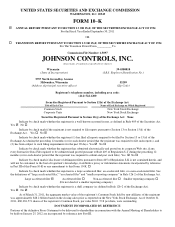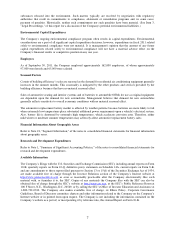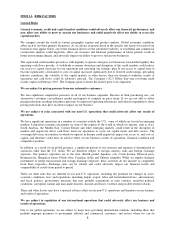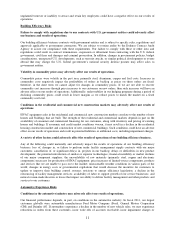Johnson Controls 2011 Annual Report Download - page 9
Download and view the complete annual report
Please find page 9 of the 2011 Johnson Controls annual report below. You can navigate through the pages in the report by either clicking on the pages listed below, or by using the keyword search tool below to find specific information within the annual report.9
business, what information or products we can supply to certain countries and what information we can provide to a
non-U.S. government, including but not limited to the Foreign Corrupt Practices Act and the U.S. Export
Administration Act. Violations of these laws, which are complex, may result in criminal penalties or sanctions that
could have a material adverse effect on our business, financial condition and results of operations.
Increased public awareness and concern regarding global climate change may result in more regional and/or federal
requirements to reduce or mitigate the effects of greenhouse gas emissions. There continues to be a lack of
consistent climate legislation, which creates economic and regulatory uncertainty. Such uncertainty extends to future
incentives for energy efficient buildings and vehicles and costs of compliance, which may impact the demand for
our products and our results of operations.
Global climate change could negatively affect our business.
There is a growing consensus that greenhouse gas emissions are linked to global climate changes. Climate changes,
such as extreme weather conditions, create financial risk to our business. For example, the demand for our products
and services, such as residential air conditioning equipment and automotive replacement batteries, may be affected
by unseasonable weather conditions. Climate changes could also disrupt our operations by impacting the availability
and cost of materials needed for manufacturing and could increase insurance and other operating costs. These factors
may impact our decisions to construct new facilities or maintain existing facilities in areas most prone to physical
climate risks. The Company could also face indirect financial risks passed through the supply chain, and process
disruptions due to physical climate changes could result in price modifications for our products and the resources
needed to produce them.
We are subject to requirements relating to environmental regulation and environmental remediation matters,
which could adversely affect our business and results of operations.
Because of uncertainties associated with environmental regulation and environmental remediation activities at sites
where we may be liable, future expenses that we may incur to remediate identified sites could be considerably
higher than the current accrued liability on our consolidated statement of financial position, which could have a
material adverse effect on our business and results of operations.
Negative or unexpected tax consequences could adversely affect our results of operations.
Adverse changes in the underlying profitability and financial outlook of our operations in several jurisdictions could
lead to changes in our valuation allowances against deferred tax assets and other tax reserves on our statement of
financial position that could materially and adversely affect our results of operations. Additionally, changes in tax
laws in the U.S. or in other countries where we have significant operations could materially affect deferred tax assets
and liabilities on our consolidated statement of financial position and tax expense.
We are also subject to tax audits by governmental authorities in the U.S. and in non-U.S. jurisdictions. Negative
unexpected results from one or more such tax audits could adversely affect our results of operations.
Legal proceedings in which we are, or may be, a party may adversely affect us.
We are currently and may in the future become subject to legal proceedings and commercial or contractual disputes.
These are typically claims that arise in the normal course of business including, without limitation, commercial or
contractual disputes with our suppliers, intellectual property matters, third party liability, including product liability
claims and employment claims. There exists the possibility that such claims may have an adverse impact on our
results of operations that is greater than we anticipate.
A downgrade in the ratings of our debt could restrict our ability to access the debt capital markets and
increase our interest costs.
Changes in the ratings that rating agencies assign to our debt may ultimately impact our access to the debt capital
markets and the costs we incur to borrow funds. If ratings for our debt fall below investment grade, our access to the
debt capital markets would become restricted. Tightening in the credit markets and the reduced level of liquidity in
many financial markets due to turmoil in the financial and banking industries could affect our access to the debt
capital markets or the price we pay to issue debt. Historically, we have relied on our ability to issue commercial
paper rather than to draw on our credit facility to support our daily operations, which means that a downgrade in our
ratings or continued volatility in the financial markets causing limitations to the debt capital markets could have an
adverse effect on our business or our ability to meet our liquidity needs.






















